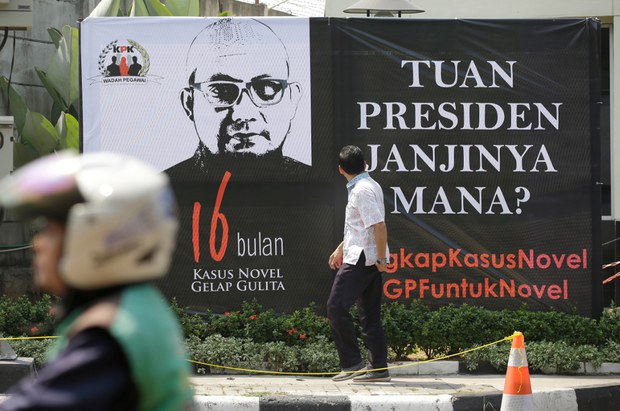Turmoil Rocks Indonesia’s Anti-Graft Body amid Alleged Attempts to Weaken It
2019.09.16
Jakarta
 A man looks at a poster in front of the office of the Indonesian Corruption Eradication Commission (KPK) showing investigator Novel Baswedan, who was attacked with acid in 2017, July 27, 2018. [AP]
A man looks at a poster in front of the office of the Indonesian Corruption Eradication Commission (KPK) showing investigator Novel Baswedan, who was attacked with acid in 2017, July 27, 2018. [AP]
Indonesia’s powerful anti-corruption commission has been hit by turmoil as proposed changes to the law governing the body and a new leadership board appointed by parliament sparked allegations that the government and lawmakers are trying clip its wings.
Leaders of the Corruption Eradication Commission (KPK) on Friday said they were surrendering their responsibilities to President Joko “Jokowi” Widodo after the House of Representatives elected a police general accused of ethical violations to lead a new five-member board of commissioners for the next four-year term.
“After considering the situation that is becoming increasingly precarious, we as officials in charge of the KPK, with a heavy heart, hand over the responsibility of managing the KPK to Mr. President,” KPK chairman Agus Rahardjo said at a news conference on Friday, referring to Widodo.
He said he felt that KPK was “being besieged from all sides.”
KPK leaders and activists have criticized Jokowi’s approval of a parliamentary initiative to amend the law governing the commission, saying that the proposed changes would jeopardize its independence.
Transparency International, a Berlin-based NGO that monitors corruption worldwide, said the proposed revision of the law governing the KPK “demonstrates continuous efforts by legislators to systematically weaken the institution.”
“Attempts to weaken the independence and authority of the KPK have serious potential to undermine its commendable anti-corruption efforts in recent years,” Delia Ferreira Rubio, chairwoman of Transparency International, said in a statement last week.
Feared and respected
This year, the commission lost a case for the first time when the Supreme Court overturned a corruption conviction and 13-year jail sentence for Syafruddin Temenggung, former chairman of the Indonesian Bank Restructuring Agency.
Since it was established in 2002, the KPK has secured the convictions of former ministers, governors, central bankers, legislators, as well as business tycoons, making it one of the most respected and feared institutions in the country.
Jokowi on Monday praised the current KPK leadership as having performed well.
“From the outset, I have never doubted the current KPK leadership,” Jokowi told reporters.
“As for the revisions to the KPK law at the House of Representatives, let us monitor together so that KPK remains strong in fighting corruption,” he said.
But the president’s words are unlikely to convince the skeptical public.
The cover of the respected news magazine Tempo featured a picture of Jokowi and his shadow with a long Pinocchio nose, under the headline “Promises, Promises.”
The proposed changes to the KPK include the establishment of a supervisory agency tasked with monitoring the commission’s conduct and restrictions on its ability to wire-tap suspects.
Phone surveillance has resulted in the convictions of many senior officials caught while accepting bribes.
Currently, KPK investigators do not require the approval of an external body to conduct wiretapping.
A recent Tempo editorial said that of the estimated 1,000 cases the KPK has handled during the past 17 years, about a quarter have involved politicians.
Masinton Pasaribu, a lawmaker from the ruling Indonesian Democratic Party of Struggle (PDI-P), said KPK must exercise its powers prudently.
“KPK must be subjected to supervision, so the establishment of a supervisory body is necessary to ensure justice,” Pasaribu said. “Wiretapping can violate human rights, so its mechanism must be regulated.”
Betrayal of reform
On Monday, lawmakers made official their appointment of five new KPK commissioners led by Inspector-General Firli Bahuri, a former investigator for the agency and the incumbent police chief of South Sumatra province.
KPK officials had earlier accused Firli of having met with two suspects being investigated by the agency, while he was working as an investigator.
An activist with Indonesia Corruption Watch, Kurnia Ramadhana, said the appointment of Firli and the proposed changes to the KPK law amount to a betrayal of reform.
“We are moving farther from the dream of a clean government, free of corruption, collusion and nepotism,” he told BenarNews.
Agus, the KPK chairman, was conciliatory on Monday, as he urged staff members to take an active part in drafting policy under the new commissioners.
“When the KPK leadership have been formally appointed by the House, there’s no more reason to reject them,” he told reporters.
Arie Firdaus and M. Sulthan Azzam in Jakarta contributed to this report.







